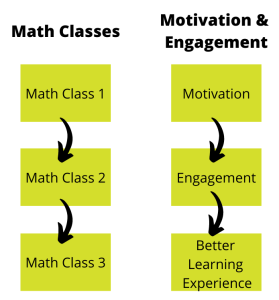
 Introduction
Introduction
To reach your academic goals and pass your expectations, finding and maintaining motivation and engagement in school is an important first step to achievement and success. This section can help give ideas on how to find and maintain motivation to engage in the things you want to do.
Factors of Motivation and Engagement
The properties of motivation and engagement are very complex as there are so many intertwined factors that can influence them. A problem many students face is determining which factor is causing them to be unmotivated or not engaged in school.
To help you identify the factors that are unmotivating and not engaging, fill out the worksheet below. If you want more information about each factor and ways you can improve your motivation and engagement, you can interact with Figure 1.
 Activity: Motivation and Engagement Surveys
Activity: Motivation and Engagement Surveys
Let’s look at identifying some of the motivational and engagement factors that are affecting you.
Motivation
Engagement
To find more information about each factor and ways you can improve your motivation and engagement, click any of the the purple ‘i’s on the graphic below.
Choose Your Own Motivation Game
We have created a role-playing game that will help you learn how to stay motivated throughout an online semester. Through this game, you will be guiding a student along a path to stay motivated throughout an online semester, exploring some of the measures you can take to feel more prepared for school.
Motivation and Engagement: A Relationship
An Analogy: Pre-requisite classes

With pre-requisite classes, you must complete the beginner class before continuing in studying the more challenging topics. In this case, Math 1 must be completed prior to Math 2. If the first course is completed with a low understanding of the topic, the second course will become harder unless the time, energy and care inputs are increased. However, if you pass Math Class 1 with a high understanding of the concepts, Math Class 2 will be easier unless you begin to slack off and reduce your time, energy and care inputs.
Similarly, you must have the motivation to begin the learning activities before you can be engaged in. Just as each math class is a separate, independent course, motivation and engagement are separate, independent, properties.
Some Examples of the Relationship
- You can be highly motivated, but it may not transition into high engagement. You can be highly motivated to find the quickest and easiest path to pass the assignment. In this example, you limit your time, energy, and care to only meet the requirements of the assignment and then move on to something more enjoyable.
- You can be highly engaged in the study assignment, but it may not mean you are highly motivated. In this example, you have decided to begin the study assignment so you might as well do a respectable job.
- You can be highly motivated and highly engaged. In this example, you find the study assignment you are doing the best thing in the world.
- You can have low motivation and low engagement. In this example you find the study assignment is the worst thing in the world.

